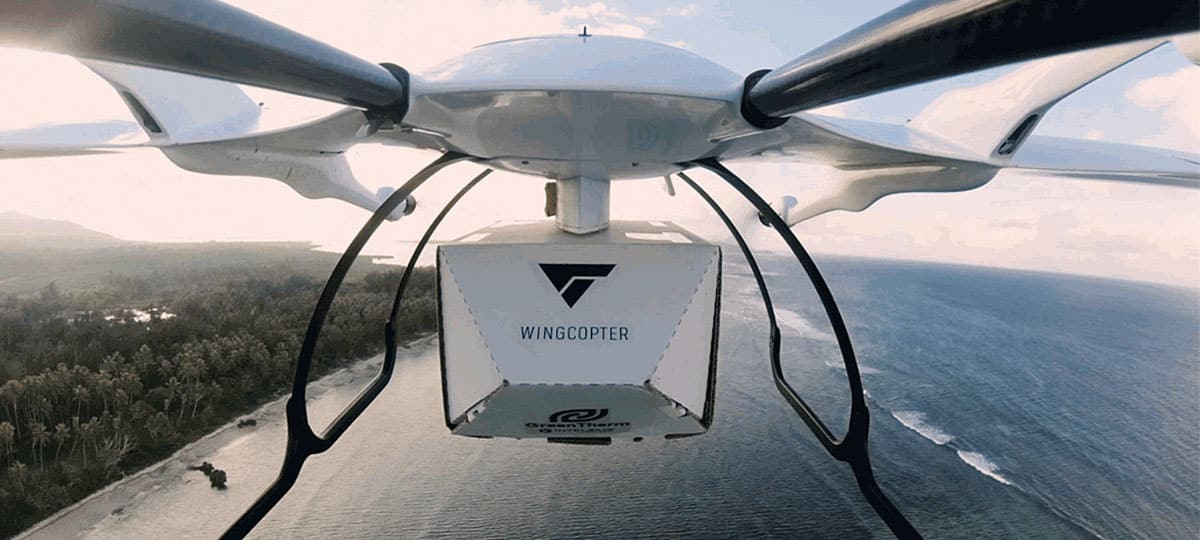Social Entrepreneurship


Wingcopter uses ERP system from the cloud
The collaboration between the Hessian logistics start-up Wingcopter and the SAP consultancy NTT Data Business Solutions impressively demonstrates how the use of innovative IT solutions can also make a valuable contribution to sustainable and social entrepreneurship.
In many parts of the world, people live in remote, hard-to-reach places. In some cases, this remoteness also involves strenuous day-long marches or car rides to get to the nearest village, get food, or even access life-saving supplies. To give people this access, three Darmstadt University graduates Tom Plümmer, Jonathan Hesselbarth and Ansgar Kadura have developed a low-emission flying drone. The motivation: to improve or even save the lives of people in need of help by delivering humanitarian aid quickly and without danger. With this idea, they founded the company Wingcopter in 2017.

"Depending on the type of mission, the drone has different technology and equipment"
Tom Ploemmer,
Co-Founder and CEO, Wingcopter
Electric-Powered Flight Systems
The start-up has now established itself as a manufacturer and service provider of unmanned eVTOL (Electric Powered Vertical Take-Off and Landing) flight systems. With the emission-saving drones, supply chains worldwide can literally be lifted into the air. Delivery times can also be drastically shortened, as the all-electric flying drones deliver supplies such as blood units or vaccines within a few hours or even minutes. What is special about the flying drone is that thanks to the patented swivel rotor mechanism, the drone can take off and land vertically in the smallest of spaces and, thanks to its wing design, reach top speeds of around 100 km/h in gliding flight. This combination of helicopter and aircraft represents a first in the civilian drone market. The start-up's three co-founders are aiming even higher with their flying drone, while focusing on humanitarian use of their technology and a value-driven commercial application. To best support this endeavor with the right IT infrastructure, Wingcopter partnered with NTT to implement an agile, cloud-based solution.
Start-up: Wingcopter
ERP in the cloud: the right choice for a wide range of requirements. Start-ups like Wingcopter often have one thing in common, especially at the beginning: The idea stands, while much of the business framework is dynamic, developing and growing. The right ERP system therefore represents an important pillar. As part of the IT infrastructure, it should be able to be integrated as seamlessly as possible into the day-to-day business and cover and accelerate the individual work processes at low cost. Many start-ups are also characterized by rapid growth, dynamic changes in their business areas, and short production and innovation cycles, while one or the other department is still being set up. That's why time is a crucial factor, especially for young companies.
In most cases, a cloud-based ERP system offers a cost-effective and flexibly scalable solution in a short time. Quite in line with Wingcopter: Within two years of its founding, the company had grown into an international hypergrowth company with more than 200 employees and a set of requirements as diverse as the drone's areas of application. The cloud-based solution grants companies like Wingcopter the resource-efficient setup of an IT department that would be significantly larger and more expensive with an on-premises system, while the stringent implementation process of the fit-to-standard approach provides a more time-efficient alternative.
Based on Rise with SAP, an SAP ERP landscape in S/4 Private Cloud Edition was tailored to the company's needs and implemented together with NTT's consultants. Decades of cross-industry experience of the IT consultant play an important role in the implementation for a fast and smooth process, so that the implementation at Wingcopter took only six months instead of the usual twelve months. Last but not least, it was important to ensure that the ERP software met the functional requirements for the processes as well as the industry and, in the case of start-ups, was quickly ready for use even without existing processes or with only a few defined processes. In such cases, it is particularly helpful to fall back on best practices, including training key users and mindful scoping with a view to factors that will be relevant in the future. This is the only way to achieve a stable IT foundation that focuses on the essential business processes while still leaving room for possible expansion and adaptation.
ERP in the Private Cloud
Not only does the organization and structure of a company need to be understood when choosing a suitable ERP solution, but product development and service also pose the challenge for the IT architecture of providing maximum scalability and cost efficiency without compromising on safety. Wingcopter is no different: depending on the type of mission, the flying drone has different technology and equipment. Depending on whether the drone is delivering lab samples past power grids and busy roads in Germany, transporting vital supplies to remote villages in Vanuatu, or surveying whale populations in the Arctic cold of Canada. In addition to prototype-related small series, Wingcopter also handles large orders, such as the manufacture and delivery of 12,000 drones to Africa.
Strict air traffic regulations also play a key role in the planning and use of the wingcopter. All these factors contribute to the need for customized adaptation. This, in turn, requires corresponding processes that enable the handling of order-specific drones - from the creation of batch and serial numbers to quality management. Intelligent automation and comprehensive data analysis tools in ERP software can facilitate these processes by enabling transparent information flows with real-time data transfer in production. Further potential lies in integrated functions and technologies that are also of great value for procurement, controlling and financial accounting.
Resilient and dynamic
By using a cloud-based infrastructure, companies are more resilient and dynamic than the competition, even in the face of unpredictable ad hoc events. Access to cloud applications in secure private cloud operation via mobile devices, which is available at any time, not only enables insight into production data, but also allows processes to be controlled remotely. This facilitates cross-team collaboration - regardless of the employees' geographical location. Another advantage of cloud-based ERP systems is the rapid expansion and deployment of applications and other technological applications.
Wingcopter shows that cloud-based solutions are particularly suitable for dynamic companies. Start-ups and hypergrowth companies in particular benefit from permanent, location-independent availability and flexible scalability as they grow. The cloud approach is also worthwhile from a financial perspective, especially for young companies, because the elimination of high investment costs in hardware and data centers allows limited resources to be used optimally. Together with NTT's experts, Wingcopter implemented an individually tailored ERP solution with a wide range of expansion options in an unusually short time. In the near future, the logistics company will continue to upgrade with the introduction of further modules, the extension of the existing SAP system and the expansion of the service platform solution and is well prepared for new innovative flights of fancy.







